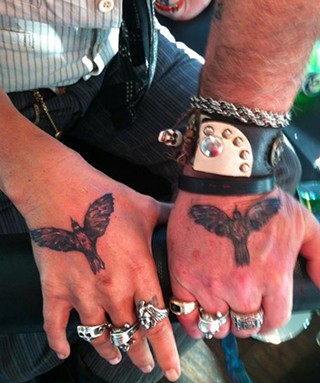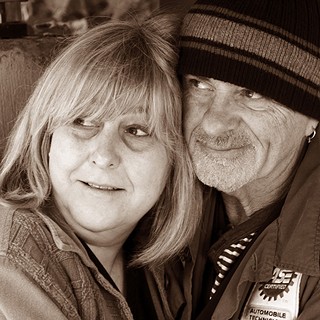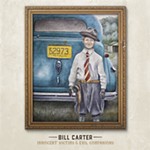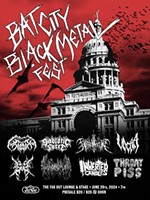The Unknown Soldier
Bill Carter, Tonto's Tonto
By Michael Corcoran, Fri., May 3, 2013
A waitress at Hyde Park Bar & Grill says she likes Bill Carter's big silver skull ring. It's from the set of Pirates of the Caribbean he tells her.
"The first one. It was made for my friend, but he wanted one with a yellow bandanna and ruby eyes, so he gave this one to me."
The waitress pauses for a long second, then starts taking our order.
Maybe she figured out that friend is Johnny Depp. She saw Carter's new CD on the table and perhaps needed that moment to put together, yeah, that's right, there's this singer-songwriter in town whose best friend just happens to be the guy who cashes the checks for Captain Jack Sparrow.
Or maybe she simply wondered what that ring would look like with a yellow bandanna and ruby eyes.
She goes and we get to talking about Unknown, a brilliantly sprawling new album that even those familiar with Carter's résumé, which includes writing "Crossfire" for Stevie Ray Vaughan and "Why Get Up" for the Fabulous Thunderbirds with his wife Ruth Ellsworth, should be knocked on their asses by just how rich and gritty it is (revisit "Texas Platters," April 5). We also converse about his 20-year best buddyship with the actor who's not only the highest-paid, but among the most respected in the business.
Bill and Ruth aren't merely acquaintances of Depp – they're the godparents of his two children with French actress Vanessa Paradis. Depp owns five homes at the end of a particular avenue in Hollywood, one of them reserved for the Carters when they visit. The actor also keeps a house in the cul-de-sac for Patti Smith, and, of course there's one for Keith Richards to use at his disposal.
Okay, enough Access Hollywood. For now.
Final Sacrifice
A great song trumps everything else in entertainment, and Unknown, which takes its name from a gravestone in a Civil War cemetery near Driftwood, needs two hands to carry them all.
Recorded on East 11th Street at James Stevens' EAR Studio, which was built as a replica of Abbey Road with its control room looking down, the LP presents the 63-year-old Carter as a one-man Traveling Wilburys, beginning with Bob Dylan and moving its way through George Harrison's spiritual pop and the guitar crunch and deadpan observations of Tom Petty. Add in the sweeping emotionalism of Bruce Springsteen and suddenly you're ashamed for thinking Carter's just a nice guy with a "skill set" instead of a prodigious talent. The 14 songs on Unknown, which will soon carry Depp's Infinitum Nihil label imprint after a soft release in March, each maintain a unique character, like a book of short stories.
The album's centerpiece is "Final Sacrifice," a haunting number Carter says was inspired by the idea of Julian Lennon turning out the lights and listening to his father's music, the Beatles. It's about being overcome with emotion by all the beauty and sadness that has come before, but also accepting it as part of the journey.
The pragmatic Oak Hill troubadour, who hasn't toured in many years because it wouldn't make financial sense, comes rarin' to hit the road with Unknown. His level of intrigue in Austin, where wife Ellsworth has established herself as a chef and clothing designer, remains on par with that of a Threadgill's chicken-fried steak. He's always been around – when he wasn't off to London, Paris, or the Bahamas with Depp, who works out with Carter and plays guitar with him during shooting downtime. Songs like lead single "Fire in the Wire," with the creepiest video on YouTube, are screaming to get out of town and propel their author from the shadows of moviemaking royalty. J.D. contributes slide guitar to West Memphis Three ode "Anything Made of Paper," cut at his home studio, but everything else on Unknown was recorded in Austin, with the vocals, drums, and acoustic guitar all laid down in one three-hour session.
"I called up [drummer] Dony Wynn and we went into the studio one day, just the two of us, and recorded 23 songs, in one take, one after the other," recalls Carter.
He details that crazy writing spurt from two years ago, when songs of deep connection came pouring out, reminding him why he left his home in Washington state in 1976 to try and become his own kind of Dylan here in Austin. For his part, Wynn hadn't heard any of the new songs before.

"Bill would play just a little bit, just to show me how the song went," says Wynn, Robert Palmer's longtime drummer, who settled in Austin in 2006. "I thought we were making demos, which really took the pressure off. We were having fun."
Stripped to their heart-and-mind essence, the songs were set for later embellishments of bass, electric guitar, keyboards, percussion, and a stray trombone, but the core of Unknown remains the tracks Carter sang like he does at home to the dogs.
"During playback I was thinking, 'Hmm, something happened here today,'" says Wynn, who knows a thing about studio magic. The Louisiana native was laying down tracks in the Bahamas on Palmer's groundbreaking 1980 synth-pop LP Clues when the band in the studio next door enlisted him for a percussion army. That was Brian Eno and Talking Heads making Remain in Light.
What's Eating Gilbert Grape
In the past two decades, when Carter spent more time hanging around movie sets than recording studios, he's seen the music industry change as drastically as baseball if they ran the bases backwards. With means of production and distribution cheaper now than what a band 20 years ago may have spent on tape alone, more people are making recordings than ever before. And it's all as free as you want it to be. Carter, a direct descendant of the first family of country music, still loves the old way of doing things.
"I have such a kinship with guys my age that are still out there playing for no other reason except to make the best music possible," he reasons over a plate of grilled salmon and green beans. "Nobody's buying records anymore? So what?"
A "health nut" who considered opening a fitness center after training with Depp on the Pirates of the Caribbean movies, Carter's still giddy about his TV network debut on The Late Show With David Letterman a couple weeks earlier. Originally, Depp was slated to sit in on guitar.
"When Dave heard, he had another idea," says Carter. "He loves Johnny, so he said, 'How about if we have Johnny on as a guest' and then they bring me out on the couch, which is pretty unheard-of for the musical guest, and then we play one. Johnny could talk about The Lone Ranger, and I could promote my album. We'd have the whole show."
Depp wasn't so sure. Aside from the short life of P, their band with Gibby Haynes that burned through a quarter million dollars of Capitol Records money in 1993, Depp and Carter's creative pursuits have been kept mostly separate.
"Ruth and I have never imposed on Johnny," asserts Carter. "That's why we're still best friends. I told him, 'I don't want to do anything to ruin our friendship. That's more important than playing on TV.'"
Apparently, that's what Depp wanted to hear. It was on. Letterman's idea. But since the show doesn't pay expenses, Carter couldn't afford to bring his Austin band, the Blame, and would have to use Paul Schaffer and company for back-up. Not so fast, Kemosabe. Depp had the plane and the L.A. musicians who played on "Anything Made of Paper," so they all flew in on Air Sparrow and the host put 'em up at the Waldorf Astoria.
This isn't an article about how to become friends with Johnny Depp, but the key might be that he approaches you first. Bill Carter & the Blame had finished up their Tuesday night residency to the usual small crowd in late 1992 when Depp, in town filming What's Eating Gilbert Grape? with Leonardo DiCaprio, approached the frontman to tell him how much he dug it – especially hearing SRV songs like "Willie the Wimp" and "Crossfire" straight from the source. Before long, he and the Carters were hanging out.
Depp would also have parties at his Sixth Street penthouse with castmates Juliette Lewis and Crispin Glover, as well as new Austin friends including Butthole Surfers' singer Haynes. That couldn't happen today, because not only has "Dirty Sixth" gotten crazier, but so has Depp's career. Carter recalls the time he and his new friend dropped into a local Skaggs Drugstore and the girl behind the counter said he looked like Johnny Depp.
"Yeah, I get that a lot," the actor said and paid for his things.
Reborn on the Fourth of July
After Gilbert Grape wrapped, Depp needed a break, so he moved in with the Carters in the Granada Hills subdivision of Oak Hill.
"We just loved hanging out together," says Bill.
The songwriter and actor also share Kentucky in common; Depp was born and raised there as was Bill's father, Cash Carter, a chief boatswain's mate stationed in Washington state who played bluegrass records every morning to wake up his three boys. Bill's grandfather, William Henry Carter, whom he's named after, was first cousin to A.P. Carter of the Carter Family. Bill's mom was born Francis Infantino, a striking Italian-American from Brooklyn, whom he calls "the greatest person I've ever known." She passed away in 2008.
Bill Carter was headed for baseball's major leagues, he figured, until he heard a Bob Dylan song in the ninth grade and dropped the mitt so he could hold a guitar. After the Beatles changed everything with their Ed Sullivan Show appearance on Feb. 9, 1964, Carter assembled a teenage band called the Chimes of Freedom in the fertile Pacific Northwest, home of the Sonics and Paul Revere & the Raiders. Then he got hooked on country music, with its fiddles and steel guitars. The stuff he had rejected growing up as his dad's music was actually deep inside him. Carter knew he had to get to Austin, the home of "progressive country," and arrived just in time for the 1976 Willie Nelson Fourth of July Picnic in Gonzales.
About a month later, he was playing an in-store with Jubal Clark at Inner Sanctum Records when he met a University of Texas English lit major from Oklahoma who wrote lyrics. Ruth Ellsworth and Carter have been partners in writing and living ever since, through times tough and flush.
In 1983, they were getting songs cut, but had to work at Xalapeno Charlie's (now Polvos) – her waiting tables and him clearing them – to keep from starving. More than a month behind on rent, they were threatened with eviction when the T-Birds recorded their song "Why Get Up." Even more promising, General Mills planned to use the song in a cereal commercial.
"I kept telling the landlord that we had money coming in," remembers Carter.
On the day $25,000 arrived from General Mills to put a hold on the song, the landlord called.
"I want you out of there today," he yelled, to which Bill Carter replied, "No problem, man."
The Carters rented a big house in West Austin the next day.
Like Julian Lennon in the dark, the Carters can look back on times both good and bad with appreciation. Bill laughs at the past 20 years, when he'd come home from months of private jets, yacht-lounging, and five-star hotel suites to play happy hour sets at Uncle Billy's.
"Half the time, me and Ruth are living the life of working songwriters," he says. "And half the time we're living like billionaires."
Unknown billionaires – what a life.
"Those dreams that lit up in the dark," he sang on the 2011 song that gains persepctive as Carter rekindles a career on hold. "Some are dead, most still live on in your heart. All is right. What a life."
Other Notable Carter/Ellsworth Covers
"Richest One," Toni Price (also covered by Counting Crows as "The Richest Man")
"Every Step of the Way," the Oak Ridge Boys
"Jacksboro Highway," by Rob Roy Parnell & Waylon Jennings (also John Mayall)
"Can I Count on You," by McBride & the Ride (co-written with Terry McBride, as was "Every Step")
"Bar Exam," the Derailers












